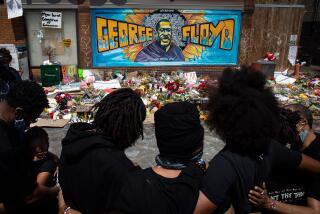This Time, TV Coverage Offers Less Symbolism, More Anxiety
- Share via
A year ago it was all about the symbolism: the bagpipers bleating out “Amazing Grace,” the throat-tightening moments of silence, the video montages of fluttering flags and tear-streaked faces, the sonorous readings of the lists of the dead. Not surprisingly, many of these visual and aural metaphors got recycled into television’s second anniversary remembrance Thursday of one of the worst terrorist strikes in history.
But if this year’s TV coverage of Sept. 11 was less exhaustive -- and exhausting -- than last year’s star-spangled, daylong spectacle, it also was edgier and more uncertain.
While the television punditocracy sought to sound appropriately patriotic and reassuring, with lots of stirring talk about how America was moving forward and noble paraphrasings of Winston Churchill, that upbeat message kept getting subverted by an undertow of ambivalence and anxiety.
Charles Gibson of ABC acknowledged Thursday’s queasy tenor when he characterized the moment as a time of “hope and renewal” offset by “a dark new message.” Throughout the day, glimpses of grieving relatives laying flowers at ground zero or tolling memorial bells amid the rolling fields of Shanksville, Pa., alternated with sober analysis of the new videotape believed to feature Osama bin Laden, State Department warnings about the possibility of future Al Qaeda attacks and periodic bulletins about a looming Mideast showdown over Israel’s vote to expel Palestinian Authority President Yasser Arafat from the Palestinian territories.
By nightfall, some viewers might’ve been experiencing emotional whiplash from trying to look backward and forward at the same time. Not to mention the emotionally scarred relatives of Sept. 11’s victims.
“It was almost worse than last year,” said Diane Horning, whose 26-year-old son, Matthew, died in the World Trade Center’s North Tower, in an interview with CNN. Part of the reason, Horning suggested, was that last Sept. 11 it was hard to imagine having to come back this year and relive the trauma all over again.
After all, last year’s carefully choreographed national pageant of mourning was meant to serve as catharsis, as the turning of a page in the American historical narrative. By contrast, this year’s commemoration -- arriving the same week that President Bush bluntly told Americans they should hunker down for a protracted struggle against terrorism and asked Congress for $87 billion toward that end -- underscored that the terrorist threat is now a fixed monument on the nation’s psychological landscape, not merely a sweeps-week ceremony akin to the Super Bowl that can be unpacked once a year, then resealed and stowed in the attic.
“Could it happen again?” was the question being asked again and again and again on Thursday, and the responses, for the most part, weren’t likely to make viewers head off to bed dreaming sweet dreams of J. Lo and Ben Affleck’s planned weekend wedding -- which, as Kendis Gibson of CNN told us, “had the rumor mill in overdrive.” Moments later, Fox interrupted its mostly thoughtful and intelligent Sept. 11 coverage with an urgent update that the two-star nuptial frenzy in Santa Barbara had been postponed. How much trauma can one nation stand in a single week?
Not all the talk was doom and gloom. “Al Qaeda is on the run, that’s the important fact,” Michael O’Hanlon of the Brookings Institution intoned to CNN’s Wolf Blitzer. That information was so important, in fact, that O’Hanlon repeated it at least twice more in the space of a couple minutes. Former Big Apple Mayor Edward I. Koch opined later in the day that what Defense Secretary Donald H. Rumsfeld “has done in Baghdad and elsewhere in the country is magnificent.”
To TV’s credit, the sentimentality-mongering of last year’s coverage had largely disappeared this time around, giving way to an understated dignity.
There also were more tough questions being asked, notably from Fox’s Tony Snow to Atty. Gen. John Ashcroft, over the nosier provisions of the Patriotic Act, and from NBC’s Katie Couric to Gen. Richard B. Myers, chairman of the Joint Chiefs of Staff, over what she called the “unraveling” of Iraq. Alas, Couric’s tough-talking persona went squishy a few minutes later when NBC ran a promo of her shilling for an upcoming segment on Dr. Phil’s “ultimate weight-loss solution.”
In New York City, local stations preempted the networks starting about 8:30 a.m. for their own coverage of the memorial service.
Before and after the 2 1/2-hour service, their reporters and anchors focused on the personal stories of loss and coping. In contrast to the first anniversary, when the coverage also looked at the city’s recovery, on Thursday New York stations put the spotlight squarely on the family and friends of the victims, what WABC anchor Bill Ritter referred to as a “private grieving process carried out in an extremely public forum.” Nary a single image of the burning towers or chaos in the dusty streets below was seen on TV all day.
About 8:40 a.m, the talking gave way to the slow tap of a drum as an American flag was marched onto center stage at ground zero.
From then on, the local anchors were silent through the end of the ceremony, listening as children related to some of the victims began the long recitation of thousands of names, a chamber ensemble performed, a choir sang and various dignitaries read poetry. Frequently, cameras panned from the stage to frame faces in the crowd.
Afterward, Ritter summed up the day’s forward-looking tone when he noted that, “While we look back and mourn all those wonderful people
With Thursday’s intriguingly conflicted coverage, TV inadvertently acknowledged that it will take more than symbolic bunting to bind up the nation’s wounds.
Elizabeth Jensen in New York contributed to this report.
More to Read
The complete guide to home viewing
Get Screen Gab for everything about the TV shows and streaming movies everyone’s talking about.
You may occasionally receive promotional content from the Los Angeles Times.







